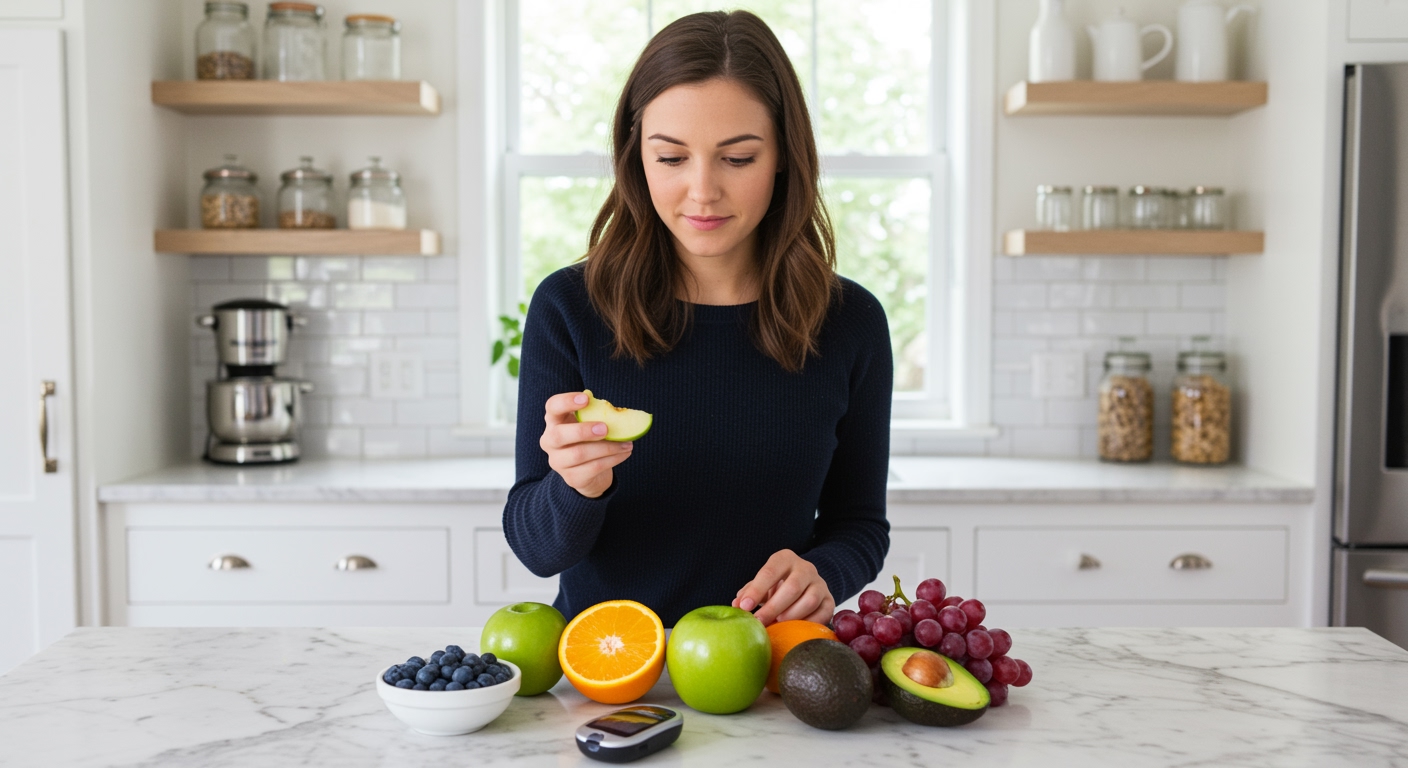✪ Key Takeaway: PCOS women can eat fruit without major insulin spikes by choosing low glycemic options and pairing them with protein or fiber.
Introduction
You stare at that beautiful apple in your kitchen and wonder if eating it will send your blood sugar through the roof.
This fear haunts millions of women with PCOS who have been told that fruit is their enemy because of insulin resistance.
Hi, I’m Abdur, your nutrition coach and today I’m going to explain exactly how PCOS women can enjoy fruit without causing dangerous insulin spikes.
What Makes Fruit Different From Other Sugars?
Fruit contains natural fructose that behaves differently in your body compared to table sugar or processed sweets.
The fiber content in whole fruit slows down sugar absorption and prevents rapid blood glucose spikes.
Research shows that the fiber in an apple can reduce the glycemic response by up to 30 percent compared to drinking apple juice.
Fruit also provides essential antioxidants and vitamins that support insulin sensitivity and reduce inflammation.
The water content in fresh fruit helps you feel full faster, naturally controlling portion sizes.
Studies indicate that women who eat whole fruit have better long-term blood sugar control than those who avoid it completely.
✪ Fact: One medium apple contains 4 grams of fiber, which is 16 percent of your daily recommended intake.
Which Fruits Are Best For PCOS Women?
Berries top the list because they have the lowest sugar content and highest fiber ratio of all fruits.
Blueberries, strawberries, and raspberries contain powerful compounds that actually improve insulin sensitivity over time.
Apples and pears with their skin provide excellent soluble fiber that helps stabilize blood sugar levels.
Citrus fruits like oranges and grapefruits offer vitamin C and flavonoids that reduce inflammation associated with PCOS.
Avocados technically count as fruit and provide healthy fats that slow sugar absorption when eaten with other foods.
Stone fruits like plums and peaches can be enjoyed in moderation, especially when they are not overly ripe.
The key is choosing fruits with a glycemic index below 55 and eating them in appropriate portions.
✪ Pro Tip: Frozen berries are just as nutritious as fresh ones and often more affordable year-round.
How Should You Time Your Fruit Intake?
Eating fruit in the morning allows your body to use the natural sugars for energy throughout the day.
Your insulin sensitivity is typically highest in the morning, making this the ideal time for fruit consumption.
Consuming fruit before exercise can provide quick energy without causing problematic blood sugar spikes.
Avoid eating fruit late in the evening when your metabolism slows down and insulin resistance naturally increases.
Pairing fruit with a small amount of protein or healthy fat further reduces its glycemic impact.
Greek yogurt with berries or apple slices with almond butter create balanced snacks that support stable blood sugar.
✪ Note: Your individual response to fruit may vary, so monitor your blood sugar if you have a glucose meter.
What About Portion Sizes And Frequency?
One serving of fruit equals about 15 grams of carbohydrates, which is roughly one small apple or half a banana.
Most PCOS women can safely consume 2-3 servings of low glycemic fruit per day without insulin issues.
Spreading fruit intake throughout the day prevents overwhelming your system with too much natural sugar at once.
Start with smaller portions and gradually increase based on how your body responds and your blood sugar levels.
Fresh fruit is always better than dried fruit, which concentrates the sugars and removes beneficial water content.
Fruit juice should be avoided completely as it lacks fiber and causes rapid blood glucose spikes.
✪ Fact: One cup of grapes contains the same amount of sugar as four whole grapes plus three teaspoons of added sugar.
Can Fruit Actually Help With PCOS Symptoms?
The antioxidants in colorful fruits help reduce chronic inflammation that worsens PCOS symptoms.
Berries contain compounds called anthocyanins that improve insulin sensitivity and support healthy weight management.
The fiber in fruit feeds beneficial gut bacteria, which play a crucial role in hormone balance and metabolism.
Regular fruit consumption is linked to lower levels of inflammatory markers in women with PCOS.
Vitamin C from citrus fruits supports healthy cortisol levels and stress management.
The natural sweetness of fruit can satisfy cravings and prevent binge eating on processed sweets.
Studies show that women who include moderate amounts of fruit in their diet have better overall PCOS management outcomes.
✪ Pro Tip: Aim for a rainbow of fruit colors throughout the week to maximize your antioxidant intake.
The Bottom Line
PCOS women can absolutely enjoy fruit without fear of dangerous insulin spikes when they choose wisely and eat mindfully.
The key to PCOS management is not elimination but education – understanding how different foods affect your unique body.
I would love to hear about your experiences with fruit and PCOS in the comments below, and please share any questions you might have about managing your symptoms through nutrition.
References
At NutritionCrown, we use quality and credible sources to ensure our content is accurate and trustworthy. Below are the sources referenced in creating this article:
- Healthline: PCOS Diet: Foods to Eat and Avoid
- Medical News Today: PCOS Diet Tips
- Hello Clue: The Link Between PCOS and Insulin Resistance
- Zita West: 12 Fruits That Are Good for PCOS





